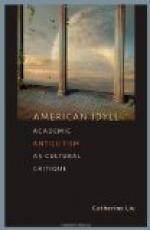I remember our first night in Munich. We arrived about supper-time, hunted up a cheap hotel as usual, near the station, fed the babies, and started to prepare for their retirement. This process in hotels was always effected by taking out two bureau-drawers and making a bed of each. While we were busy over this, the boys were busy over—just busy. This time they both crawled up into a large clothes-press that stood in our room, when, crash! bang!—there lay the clothes-press, front down, on the floor, boys inside it. Such a commotion—hollerings and squallings from the internals of the clothes-press, agitated scurryings from all directions of the hotel-keeper, his wife, waiters, and chambermaids. All together, we managed to stand the clothes-press once more against the wall, and to extricate two sobered young ones, the only damage being two clothes-press doors banged off their hinges.
Munich is second in my heart to Heidelberg. Carl worked hardest of all there, hardly ever going out nights; but we never got over the feeling that our being there together was a sort of gift we had made ourselves, and we were ever grateful. And then Carl did so remarkably well in the University. A report, for instance, which he read before Brentano’s seminar was published by the University. Our relations’ with Brentano always stood out as one of the high memories of Germany. After Carl’s report in Brentano’s class, that lovable idol of the German students called him to his desk and had a long talk, which ended by his asking us both to tea at his house the following day. The excitement of our pension over that! We were looked upon as the anointed of the Lord. We were really a bit overawed, ourselves. We discussed neckties, and brushed and cleaned, and smelled considerably of gasoline as we strutted forth, too proud to tell, because we were to have tea with Brentano! I can see the street their house was on, their front door; I can feel again the little catch in our breaths as we rang the bell. Then the charming warmth and color of that Italian home, the charming warmth and hospitality of that white-haired professor and his gracious, kindly wife. There were just ourselves there; and what a momentous time it was to the little Parkers! Carl was simply radiating joy, and in the way he always had when especially pleased, would give a sudden beam from ear to ear, and a wink at me when no one else was looking.
Not long after that we were invited for dinner, and again for tea, this time, according to orders, bringing the sons. They both fell into an Italian fountain in the rear garden as soon as we went in for refreshments. By my desk now is hanging a photograph we have prized as one of our great treasures. Below it is written: “Mrs. and Mr. Parker, zur freundlichen Erinnerrung—Lujio Brentano.” Professor Bonn, another of Carl’s professors at the University, and his wife, were kindness itself to us. Then there was Peter, dear old Peter, the Austrian student at our pension, who took us everywhere, brought us gifts, and adored the babies until he almost spoiled them.




